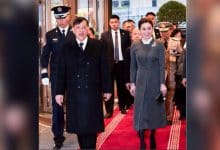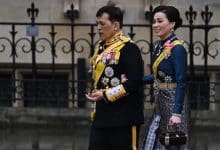The year of living dangerously – Thai protesters utter the unthinkable
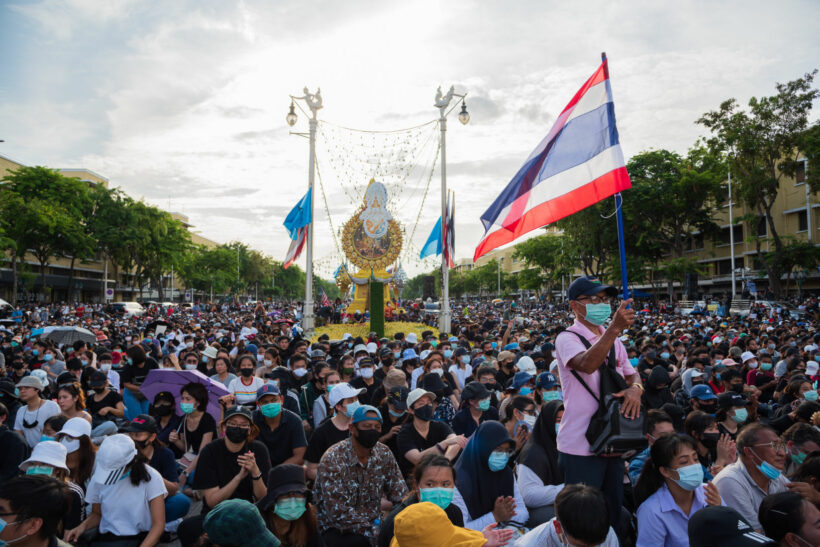
OPINION
An estimated 10,000 anti-government protesters packed Bangkok’s Democracy Monument and the roads either side on a warm Sunday afternoon, calling for democratic reform, changes to the NCPO-written constitution and for the dissolution of parliament. They also spoke about the country’s head of state, questioning the institution.
Even a few months ago this would have been considered an absolute no-go topic in Thailand. Apart from hushed conversation behind closed doors, Thailand’s monarchy is not up for public discussion and the position of Monarch is held in the highest respect, but not by everyone.
Sunday’s protest was the biggest pro-democracy rally since the Thai military seized power in May 2014 in a soft coup. Almost daily demonstrations, started by secondary and tertiary students across the country a month ago, are now attracting a much broader cross-section of society. And the crowds are getting larger.
Thai PM Prayut Chan-o-cha has acknowledged the protesters and even offered to meet with them, but hasn’t. He’s even conceded that the Constitution could be reviewed, but nothing has happened as yet. So the protests continue to gather broader support and the Government are probably hoping the rainy season starts getting wetter again, soon.
The protests couldn’t have come at a worse time for the Prayut government, still picking up the political pieces after a cabinet reshuffle, trying to cope with an economy suffering the ravages of an earlier 2 month lockdown and a tourist industry without any tourists. Then again, the country’s opposition forces may be sensing the moment of weakness and are making a decisive move.
The topic of the country’s Monarch has been a no go topic for, well, forever. Even though the absolute monarchy ceased in 1932 in another soft coup by a new Democratic government, the position has retained its emotional appeal for the Thai people, particularly through the work of the the former Thai King Bhumibol Adulyadej. He took on the position of the people’s King with a quiet resolve and was regularly seen traipsing through mud, checking out irrigation projects or heading ‘up country’ to meet the people. His 70 years on the Thai throne lasted through 29 prime minsters, 12 military coups, countless regional conflicts, the threat of Communism, the Vietnam war and the impact of modernism on the previously agrarian Thai economy.
Upon his passing in 2016, King Bhumibol’s son, Crown Prince Maha Vachiralongkorn, ascended the Thai throne… the 10th King of the Chakri dynasty. Rama X was crowned in May 2019 during 3 days of celebration, pomp and circumstance.
Just a year ago the very thought of any Thai openly questioning the role of Thailand’s Head of State would have been completely unthinkable. Thailand’s strict lese majeste laws prevent criticism of the Thai King and other members of the Royal Family. But it’s also been a topic that is NEVER discussed in polite or public conversation. Now the murmurings behind closed doors have, unthinkably, spilled out onto the streets.
One of the leading protesters Anon Nampa, a human rights lawyer, says the protests are now reaching beyond Bangkok and are more than just a student rabble.
“I am so thrilled to see a lot people turned out to join the protest today. The movement has gone beyond just the youth group. As you see there are more older people, and some of them even attended the protest with their family.”
Anon was arrested and detained on August 7 on sedition charges relating to an earlier protest he had attended. Out on bail, and warned to tone down his rhetoric, he continues to make the same calls for reform.
“I am not afraid, I have been waiting for this moment for a very long time. The court granted me bail, I should not repeat the same offences but it doesn’t mean I can’t exercise my rights under the constitution.”
Anon’s open discussion, and criticism of the Thai Head of State is the first time these comments have been made in a highly public forum, and widely reported. It should also be noted that his comments have not been personal but aimed at the position of the Head of State and the powers provided by the Constitution.
Whilst the government and police are, so far, being broadly tolerant of the unprecedented comments, most agree that it is only a matter of time before some grey line would have been crossed and Anon, and others, will be rounded up for “attitude adjustment”… usually a reasonably polite meeting with Army leaders to “pull your head in”.
With darker economic times ahead, Thai people are looking for changes to their circumstances. The trust in the leadership of the Bangkok establishment, along with the support of the Army, is wavering. The quasi-democratic government has just gone through a rocky cabinet re-shuffle and is scrambling to get a handle on a post-Covid economy and figuring out how to safely re-open the borders for general travel. The last thing the government wants right now is to negotiate with a comparatively small group of protesters with demands they are unlikely to entertain.
The last part of the demonstrators’ shopping list – changes to the Thai monarchy – would even be difficult for Prayut and his conservative MPs to say out loud. Most Thais, of the older generation, don’t even have the vocabulary to discuss these issues openly.
But a lecturer and special adviser at Naresuan University’s ASEAN Community Studies, Paul Chambers, says the cat is now out of the bag.
“It is important to understand that, with a large group of demonstrators demanding monarchical reform, the cat is out of the bag for the first time, meaning that henceforth monarchical reform is a valid demand for Thai demonstrators.”
And now that certain words and ideas have been publicly voiced, they can’t be unsaid. That grey line has already been crossed.
Continued calls for reform to the position of Thailand’s Head of State would be highly divisive and could alienate large swathes of Thais. And it would limit the sympathy of the broader Thai populous for the student’s push for more general democratic reform.
There is also a limit to how hard the students can push their demands. As it is, the protests have been largely peaceful, even joyous. But police and officials have been looming on the fringes, monitoring faces and recording the comments made. Both the government and the protesters fear a violent push-back or a military crackdown. Anti-establishment protests have turned ugly in the past… no one wants a return to Thailand’s darker days of political reform. The government also realise any crackdown would likely draw more sympathy to the protester’s demands and weaken the government’s position.
At this stage the Thai PM Prayut has said he was “worried and concerned about this movement” but has warned protesters against involving Thailand’s monarchy in their list of reforms.
“I feel for our children, youths and university students and I also share their parents’ worries too. But there must be a vigilance about violations, I think people won’t tolerate it and allow an incident like this to happen again.”
Thailand’s inequality between the rich and poor, the ongoing divide between the Bangkok elite and the agrarian north and north east, a stale economy trying to recover from the impacts of Covid-19 lockdowns, and the circumstances that led to Prayut being in the top job, all weigh heavily on the otherwise eternally patient Thai psyche.
There’s still a third of 2020 to run and, if the past 8 months are any indication, it has already proven to be the year of living dangerously for Thailand. And all that could merely be a rehearsal for the months to come.
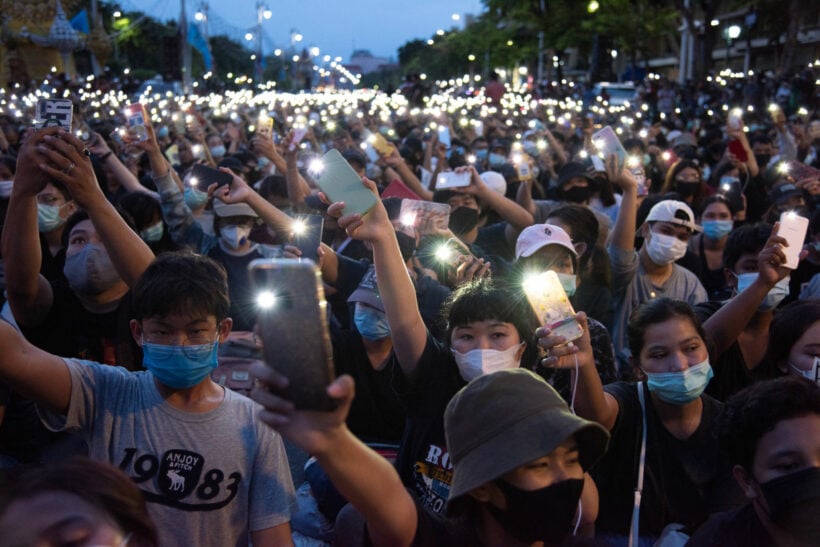
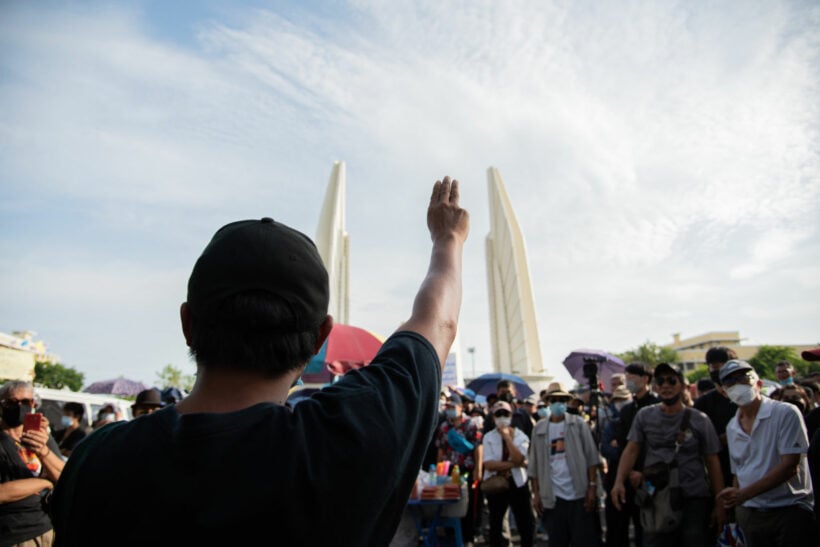
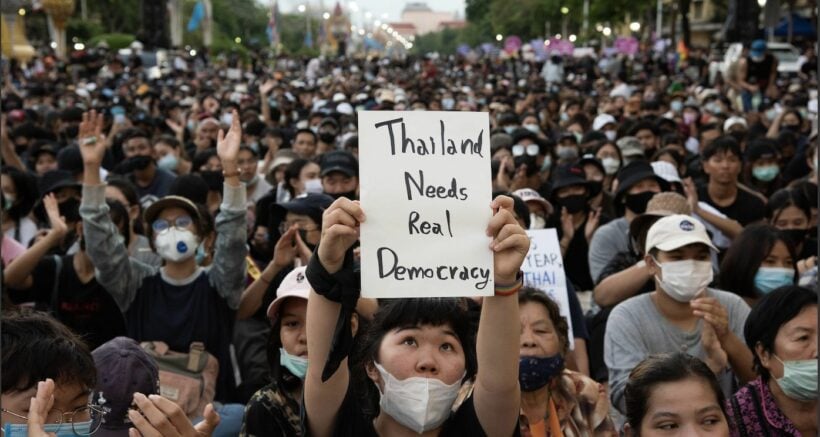
Latest Thailand News
Follow The Thaiger on Google News:
